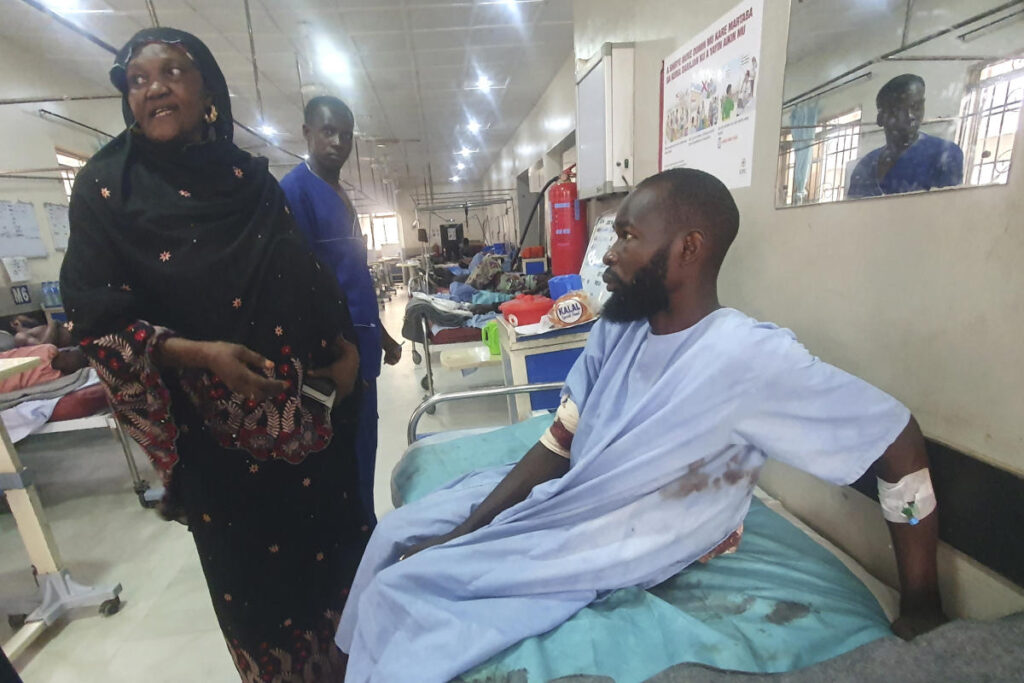MAIDUGURI, Nigeria (AP) — For the first time since 2020, there have been three female suicide bombers attacked the Nigerian border town of Gwoza, where Boko Haram extremists declared a short-lived caliphate 10 years ago, a sign that the world’s longest war on militants is still ongoing.
This came two days after officials hailed success in their war against extremists, with Nigeria’s military spokesman, Major General Edward Buba, telling reporters the oft-used phrase: “We have greatly degraded the terrorists.”
The first of three coordinated suicide bombings on June 30 targeted a crowded wedding, the second was detonated at the funeral of the victims, and the third at a hospital treating the wounded.
The attacks killed at least 32 people in total, including nine relatives and friends of Mohammed Kehaya, a resident who now worries about his safety in Borno state, a hotbed of Islamist militancy where extremists once hundreds of schoolgirls kidnapped in 2014.
No group claimed responsibility for the bombings, but blame was quickly placed on the authorities. Boko Haramwho have been launching an insurgency since 2009 to establish their radical interpretation of Islamic law, or Sharia, in northeastern Nigeria. They have since splintered into several factions, which together have been responsible for the direct deaths of at least 35,000 people and the displacement of more than 2 million people amid a humanitarian crisis with people in urgent need for foreign aid.
However, Nigerian authorities continued to insist that the attacks were not a “setback.”
Nigeria’s defence chief, General Chris Musa, said the bombings were more of a “sign of desperation” and described them as a one-off by the militants. “Some individuals would do anything to prevent us from succeeding,” he said.
However, several security analysts and local residents interviewed about the bombings expressed concern that the attacks required a lot of planning and coordination and were dangerous for Borno, where some villages lack security.
According to Vincent Foucher, senior consultant analyst for West Africa at the International Crisis Group, one of the extremists’ goals could be to distort the narrative that the security situation in the region has normalized.
“It’s a way of showing that the war continues,” Foucher said.
In Borno, the three bombings sent shockwaves through families, leaving many wondering whether to pack their belongings and flee again.
“Parents have been calling to ask if their children can safely go back to school,” said Yusuf Ibn Tom, a teacher at a public school in Maiduguri. “Everyone here is scared.”
At the height of the insurgency in 2014, Boko Haram was considered the world’s deadliest terrorist group, killing at least 6,000 people that year alone, according to the Institute for Economics and Peace’s Global Terrorism Index. Much has changed since then, making the extremists far less deadly.
The military has pushed them further to the borders of the Lake Chad axis, and the death of the group’s founder in 2021, Abubakar Shekaudemoralized some members and made suicide bombings less popular. Clashes between Shekau’s faction and those linked to the Islamic State group have turned the extremists on themselves, sometimes shifting the focus of attacks away from the military and civilians and even contributing to the overflowing of thousands who are undergo a reintegration program.
But what hasn’t changed over the years is the extremists’ “operational capability,” said Cameron Hudson, an Africa expert at the Center for Strategic and International Studies.
Attacks like the latest “are rarely one-off incidents and are often part of a broader series,” Hudson said, not ruling out the possibility of more in the future. “That will give a better indication of the relative strength of the insurgency today and the ability of the Nigerian military to respond,” he added.
____
Asadu reported from Abuja, Nigeria.
____







